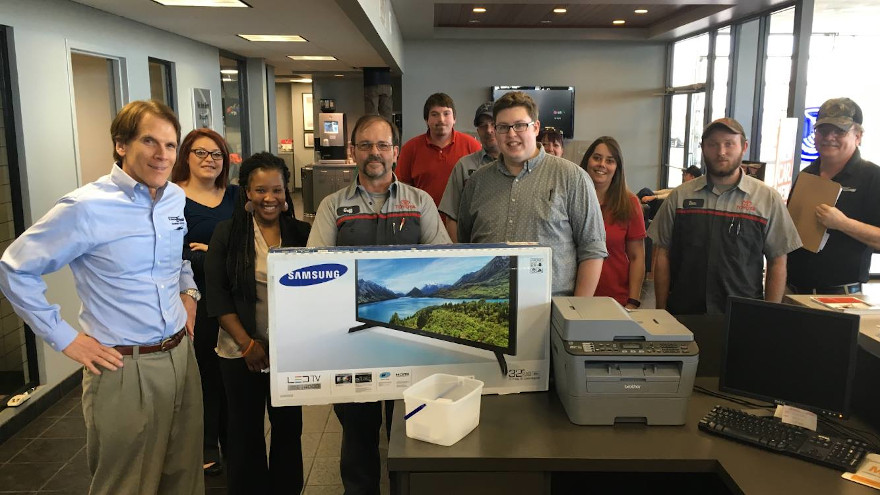The National Automobile Dealers Association said Monday it has been chosen as the exclusive provider of 20 Group services for the Minority Dealer Development 20 Groups at General Motors.
The GM MDD program strives to attract and retain minority dealers to the automaker’s dealer network, while also supporting GM’s existing minority dealers.
The MDD 20 Group meetings start this year.
“For many years, NADA has been a leading-provider of 20 Group meeting moderation services in the automotive industry,” said Carlos Latour, who is director of dealer diversity relations at GM, in a news release.
“The General Motors Dealer Diversity team is impressed with NADA’s innovative offerings which will help advance the performance and operation of our minority dealers. NADA has a strong team with experienced and dedicated consultants, as well as industry-leading web-based tools which will help dealers improve their performance,” Latour said. “Together with our minority dealers, we look forward to a long-lasting relationship with NADA.”
Mike Stanton, NADA’s president and chief executive officer, said: “NADA is committed to promoting diversity, equity and inclusion throughout the auto industry, and we believe one of the best ways we can accomplish that goal is through our class-leading Academy and suite of consulting services.
“By giving minority constituencies within the auto retail community more and more tools to thrive and succeed, we’ll be working our way toward a more diverse and inclusive dealer body for years and hopefully generations to come,” Stanton said. “We are incredibly excited to facilitate these 20 Group meetings and support minority GM dealers, and we hope to announce similar initiatives in the coming months.”
Robert Brogden is the owner/president of Robert Brogden Buck GMC in Olathe, Kan., and is a NADA board member. He added: ““The GM Minority 20 Groups are a vital step in enhancing diversity in the auto retail industry.
“I look forward to NADA facilitating these meetings and working alongside other minority GM dealers, not only to boost our own businesses, but also to highlight that minority dealers are key to the overall dealer body and automotive industry.”
For most of my career as a dealer, I’ve been endangered.
I’m essentially a woolly mammoth on the plains: big, slow, and irresistible to spear-tossing cavemen. I should be extinct. And I will be. Any day now.
At least, that’s what you might think if you believed commercials like this one aired that during the Superbowl. Wall Street-backed startups that think they’ve cracked the code to auto retailing are a dime a dozen — but are they a threat to dealers?
Let me put it this way: I sleep just fine at night.
Despite years of being told dealers are on their way out, I’m still here. And so are you. The Internet didn’t put us out of business. We figured out a way to make it work for us. Our manufacturers haven’t severed our relationships; they’re stronger and more important than ever.
No Carvana vending machine is haunting my dreams — I know my customers want a better experience than they get when buying gum. To put it simply: throughout history dealers have always evolved, and risen to every challenge, in order to meet their customers’ needs.
The truth is, there is no code to crack on auto retailing. We’re not Blockbuster. No one can stream a new Toyota Highlander to your driveway.
Buying a vehicle is the second biggest purchase, after a home, most consumers will make in their lifetime. They still want to touch metal, kick tires, and test-drive their options. They want to know there is a brick and mortar store where they can ask actual humans questions, look for advice, get their oil changed, and learn about recalls.
In a recent study, Capital One found that 94% of buyers are most comfortable purchasing a vehicle from a dealership (82% of respondents plan to visit more than one) and 92% of buyers say the test drive is an important part of the buying process.
Buying a vehicle isn’t a one-and-done transaction. Consumers want the security of having someone in their corner for the entire life of that vehicle. And with their local auto dealer, that’s what they get. And unlike the Vrooms of the world, our profits don’t go to shareholders — they go back into our community.
International nameplate dealers alone employ 564,000 workers with a payroll of $34 billion. We sponsor the local Little League and food bank. We pay taxes that go right to local schools and roads. We care what happens in your town because it’s OUR town. And that’s something that no vending machine can ever say.
Steve Gates is the 2021 AIADA chairman. This Op-Ed can also be found here.




